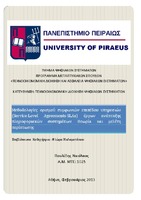Μεθοδολογίες ορισμού συμφωνιών επιπέδου υπηρεσιών (Service-level agreements - SLAs) έργων ανάπτυξης πληροφοριακών συστημάτων. Θεωρία και μελέτη περίπτωσης

View/
Abstract
In recent years, the Service Level Agreements (SLA) tend to be the most important factors of success in the development of Information Systems and in the high-tech sector. A SLA is a contract between a service provider of an Information System or service and the client. Its purpose is to express quantitatively the quality of the services provided and to ensure that it always meets, at least the minimum acceptable requirements, of the client. An important role in this project is the explicit and clear definition of the requirements and the expectations of the client. The aim of this work is to create a multi-facet study and process information, regarding the SLA in developing IT projects, so as to contribute to the promotion of the Information Systems scientific field. Initially, the basic concepts and functions of SLA are analyzed and then the species and the main categories are referred to regarding the implementation of the Information Systems. It then further describes the basic architecture and methodology for the implementation of these contracts, as well as for the metrics used in this procedure. In addition, the methods and tools used for the monitoring and evaluation of the service covered by the SLA, are mentioned. The attention here is focused on some specific issues that need to be dealt with. At the end, a detailed description is presented, on the implementation of Cloud information infrastructure, to a large hotels & resorts group. In the years to come, the role of the SLAs in the Information Systems projects, will be particularly important and it is expected to play a leading role, as they provide added value in the use and implementation of new technologies applied by organizations which, in turn, are intended to support the strategic choices, the business objectives and the maintenance or creation of new competitive advantages.


